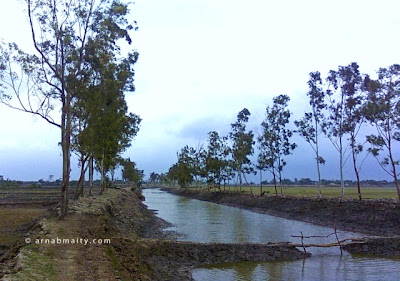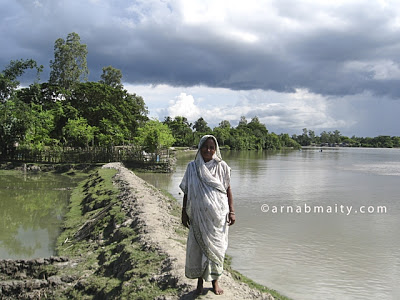‘The old ‘Seth Thomas’ swings its pendulum to strike three as my legs push against thamma’s quilt, finding the perfect orifice for a sliding escape from the forced afternoon nap. I have fifteen more minutes to run to the banks of river Gaureshwari to ogle at the only public transport system of the region, the ‘Launch’. I run along the emerald paddies on the elevated dusty track as the sun plays hide and seek through the occasional bamboo groves. The launch siren makes the sprint faster and my little heart pumps to glory; I must make it to the ‘Ghat’ to catch the sight of the day.
At the first sight, the red striped launch pierces the horizon, arising out of the deep blue background sky and gingers its way into the silver-glinting river that ribbons through the mangroves on either side. I stand glued at the embankment as the ferry driver rings the anchoring bell. The jetty is non-existent and the only way one can disembark is by walking on a thin plank of wood, holding a long bamboo stick carefully planted on the swampy riverbank. Slowly the passengers come out folding up the trousers or holding up the dhoti or sari, to cover the distance till the levee, on knee-deep mud. Their luggage, a jute sack or a nylon bag full of necessities bought from the town, hang from their shoulders. Some of the kids enjoy a nice little ride on their parent’s shoulders; I watch them in disgust and think of each and every mortal who tried to do that to me. How I love walking on those muddy trails than being on someone else’s shoulder!’
The only public transport system in those days
Whenever I think of my childhood, the reminiscences of the times spent at my grandfather’s place keep flashing in front of my eyes. They take me inside the cranium of a young boy, about eight years old, who yearned to run away alone to his ancestral house during vacations. My mother was always hesitant on sending me alone as she thought I might be a menace to the peace in the lives of my grandfather (dadu) and grandmother (thamma), yet my father knew, this was the best way to connect me to my roots and he would do all the necessary arrangements to send me with someone from his native village.
Being at the Border
Bhola Da grabs me by the fists as I jump onto the deck from the plank that connects the wooden jetty to the ferry. I am onboard M.V Maa Bonbibi, which promises to touch the shores of my ancestral village in another two hours. This is my first launch ride without my parents, but I have ensured not to miss the alluring opportunity of sneaking a peek at our neighboring country, by packing a pair of binoculars in my backpack. The launch takes off from Hasanabad, the last significant town before the islands that lead to the famous delta of Sundarbans. I cling to the port of the vessel as it cruises through the iridescent river Ichhamati, with eyes fixed at the binocular. In about half an hour my inquisitive mind gets stocked up with questions, which I throw at Bhola Da:
“Bangladesh looks just like our country, the same paddy fields and coconut palms strewn all over! Are you sure it’s Bangladesh on the other side of the river? Why is this vessel sailing close to the land on this side and not going towards the middle of the river? Why are those people from the army sitting by the riverside with their guns pointed towards us?”
Doing perfect justice to his teaching experience, Bhola Da unravels the mysteries tossed at him with ease and I get to know the history of Bangladesh. I understand, the people living on the other side of the border are not aliens and we share the bounties of nature, the food habits and also the language. I get to know what is a “no man’s land” between the borders and why we need the Border Security Force (BSF) at the edge of our lands, holding rifles pointed towards the other end. However, the river, the birds and the wind don’t seem to care about these boundaries created by us.
River Ichamati with Bangladesh on the other side
The Steep Learning Curve
It’s hardly five in the morning and I wake up to dadu’s alarm raised from his vocal cords. “Early to bed and early to rise, makes a man, healthy, wealthy and wise” has always been his mantra and he makes sure that his grandson follows it to perfection. An active participant in India’s freedom struggle and being the true Gandhian, he believes in self-sufficiency. He hates foreign goods and wrests his faith in all things natural. As we walk into the plantation behind our house, he flings the neem twig towards me. “Stop using those chemical toothpastes and use this to keep your teeth strong and stable,” he says with a wide grin. In the next hour I learn to recognize Mango, Jackfruit, Blackberry, Star Apple, Custard Apple, Litchi, Sapodilla, Guava and Pomegranate trees. I enjoy the discussion that centers on tree care, pest protection and fruit bearing time. At times though, dadu gets a tad emotional and talks about his old days as a young man when he had to hide in this plantation from the British Police. Topics shift from Botany to India’s Modern History and his face glows with excitement telling the stories from the Swadeshi Movement. This is what I love the most about his company, his immaculate narrative style that creates a virtual stage in front and makes the historical characters enact in it. On our return, I see the history in print as well, through the books in his mini library, but I get drawn to the trophies awarded to him by the Government for his contributions to the freedom movement. While he is still busy telling me those stories, I mutter, “I am proud of you Dadu”.

The jackfruit trees at the plantation
The day, which started with the walk accompanied by Dadu, now lands up into intense training sessions with Kochi, a young lad who works in our farms. He teaches me how to climb the coconut trees taking breaks from his work. In the afternoon, we dive into the shallow ponds and my first lessons at swimming kick-starts. Later in the day, I go in to explore the barn that hosts thamma’s precious possessions, a group of jersey cows. Thanks to Radha (our household help), my learning sessions at milking cows since a week are bearing fruits. I feel I have become quite an expert at it, but not without a few bruises here and there, thanks to the kicks from the cattle.
In the evening I walk towards the canal, used for the purpose of irrigation in the village. During high tides, the river water gushes into it along with the fishes, encouraging the avian fish eaters to have a swoop on their meal of the day. I learn about the egrets, the herons and the kingfishers from Binu Kaka, the teacher at the village high school. He is an avid bird watcher and one can invariably find him near the canal after his classes gets over.

The canal in the evening
The nights here are pitch dark without electricity but that is the time when thamma’s stories flourish. She starts with the man-eaters of Sundarbans and continues to the ghosts and spirits found in the bamboo groves near our plantation. When my face shows signs of fear, she drops the topic and reads out chapters from the Mahabharata under the flickering oil lantern. Bheema, the epitome of power and strength inspires me to be strong but the shadows created on the opposite wall make me close my eyes. Before thamma finishes the chapter, I am already lost in my world of dreams…
The Lantern
It is difficult to come out of the mind of that young boy who was responsible for creating the ‘me’ in myself. My likes, dislikes, interests and opinions are all biased by the experiences I had as a child in my ancestral village.
My vacations were my extra classes in the lap of nature. I swam on the rivers, milked the cows, went fishing with homespun nets, climbed tall trees and imitated the sounds of the songbird. I learnt farming, cooking and all survival techniques that made me adapt to any situation anywhere. Now when I look back after two decades, I can connect the dots easily. I know where my love for nature came from and why I desperately look to run out of the concrete jungles to experience the 100% real. When I get bogged down by the artificiality around, I just close my eyes and I am back inside the cranium of that young boy, who runs through the emerald paddies into his little world amidst mangroves, man-eaters and meandering rivers.

